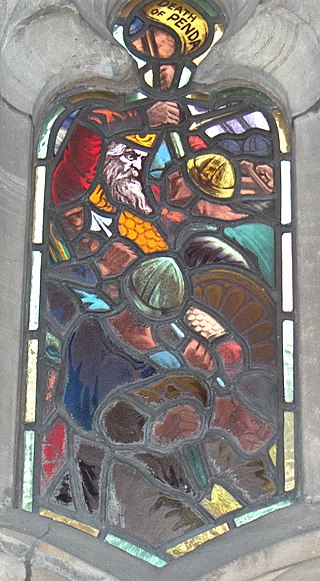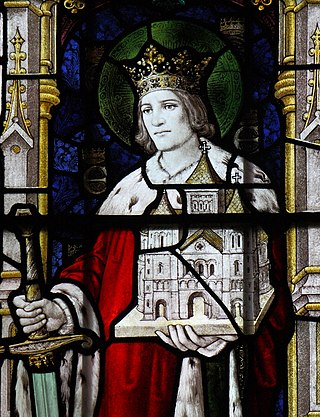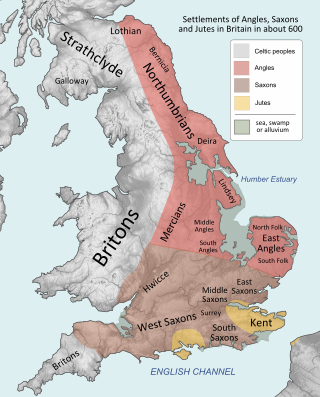
Rædwald, also written as Raedwald or Redwald, was a king of East Anglia, an Anglo-Saxon kingdom which included the present-day English counties of Norfolk and Suffolk. He was the son of Tytila of East Anglia and a member of the Wuffingas dynasty, who were the first kings of the East Angles. Details about Rædwald's reign are scarce, primarily because the Viking invasions of the 9th century destroyed the monasteries in East Anglia where many documents would have been kept. Rædwald reigned from about 599 until his death around 624, initially under the overlordship of Æthelberht of Kent. In 616, as a result of fighting the Battle of the River Idle and defeating Æthelfrith of Northumbria, he was able to install Edwin, who was acquiescent to his authority, as the new king of Northumbria. During the battle, both Æthelfrith and Rædwald's son, Rægenhere, were killed.

Northumbria was an early medieval Anglo-Saxon kingdom in what is now Northern England and south-east Scotland.
Oswiu, also known as Oswy or Oswig, was King of Bernicia from 642 and of Northumbria from 654 until his death. He is notable for his role at the Synod of Whitby in 664, which ultimately brought the church in Northumbria into conformity with the wider Catholic Church.

Penda was a 7th-century king of Mercia, the Anglo-Saxon kingdom in what is today the Midlands. A pagan at a time when Christianity was taking hold in many of the Anglo-Saxon kingdoms, Penda took over the Severn Valley in 628 following the Battle of Cirencester before participating in the defeat of the powerful Northumbrian king Edwin at the Battle of Hatfield Chase in 633.

Edwin, also known as Eadwine or Æduinus, was the King of Deira and Bernicia – which later became known as Northumbria – from about 616 until his death. He converted to Christianity and was baptised in 627. After he fell at the Battle of Hatfield Chase, he was venerated as a saint.

Æthelfrith was King of Bernicia from c. 593 until his death. Around 604 he became the first Bernician king to also rule the neighboring land of Deira, giving him an important place in the development of the later kingdom of Northumbria. He was especially notable for his successes against the Britons and his victory over the Gaels of Dál Riata. Although he was defeated and killed in battle and replaced by a dynastic rival, his line was eventually restored to power in the 630s.
Bernicia was originally the Brittonic Celtic kingdom of Bryneich from the late 4th century and later the Anglo-Saxon kingdom of 'Bernicia' established by Anglian conquerors of the late 6th century in what is now southeastern Scotland and North East England.

Deira was an area of Post-Roman Britain, and a later Anglian kingdom.
Ælla or Ælle is the first known king of the Anglian kingdom of Deira, which he ruled from around 560 until his death in 588.

Ida is the first known king of the Anglian kingdom of Bernicia, which he ruled from around 547 until his death in 559. Little is known of his life or reign, but he was regarded as the founder of a line from which later Anglo-Saxon kings in this part of northern England and southern Scotland claimed descent. His descendants overcame Brittonic resistance and ultimately founded the powerful kingdom of Northumbria.
The Battle of Degsastan was fought around 603 between king Æthelfrith of Bernicia and the Gaels under Áedán mac Gabráin, king of Dál Riada. Æthelfrith's smaller army won a decisive victory, although his brother Theodbald was killed. Very little further is known about the battle. The location of the nominal Degsastan is not known, either; Dawstane in Liddesdale, Scotland, is a possibility.
Eanfrith (590–634) was briefly King of Bernicia from 633 to 634. His father was Æthelfrith, a Bernician king who had also ruled Deira to the south before being killed in battle around 616 against Raedwald of East Anglia, who had given refuge to Edwin, an exiled prince of Deira. His mother was Acha of Deira.
Æbbe, also called Tabbs, was an Anglian abbess and noblewoman. She was the daughter of Æthelfrith, king of Bernicia from c. 593 to 616. She founded monasteries at Ebchester and St Abb's Head near Coldingham in Scotland.
Glappa of Bernicia ruled from 559 to 560. He was the second known king of Bernicia.
Adda was the third known ruler of the Anglo-Saxon Kingdom of Bernicia.
Aethelric or Æþelric was the fourth known king of the Kingdom of Bernicia which he ruled from 568 to 572.
Theodric or Ðeodric ruled from 572 to 579. He was the fifth known ruler of the Anglo-Saxon kingdom of Bernicia.
Frithuwald of Bernicia ruled, perhaps from 579 to 585. He was the sixth known ruler of the Anglo-Saxon kingdom of Bernicia.
Hering, son of Hussa was a Bernician prince. He was the son of Hussa, king of Bernicia from 585 to 592 or 593. After Hussa's death the kingdom went to Æthelfrith, Hering's cousin. During the first half of Æthelfrith's reign, Hering fled to Dál Riata, where he was given refuge by their king, Áedán mac Gabráin.
A number of royal genealogies of the Anglo-Saxon kingdoms, collectively referred to as the Anglo-Saxon royal genealogies, have been preserved in a manuscript tradition based in the 8th to 10th centuries.